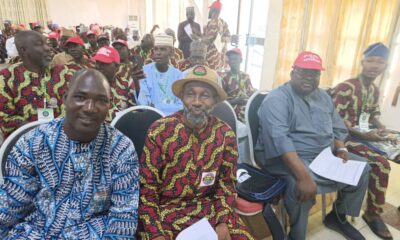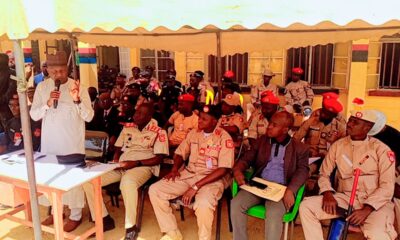Headlines
Transfers Gone Missing: Nigeria’s frustrating digital bank transactions

Zulaiha Danjuma
Imagine expecting to receive payment for the goods you sold to a customer only to find that the significant amount of money never reached your bank account. For Malam Haruna Yau, a palm oil vendor in Kano State, Nigeria, this nightmare became a reality.
KANO FOCUS reports that, despite his initial skepticism about adopting electronic bank payments for his business, Haruna decided to open a bank account to receive payments from his customers.

However, he soon faced numerous challenges with vanishing funds due to network glitches causing discrepancies between customer transactions and his received payments.
“The major problem we have is the unpredictable network issues, which can be quite frustrating when trying to receive payments from customers,” Haruna explained. “Because of these network issues, we find ourselves going back and forth with customers on payments they say they made, which don’t reflect in my account. And in some cases, the money shows up much later.”

Malam Haruna Yau
One specific challenge Haruna faced was when he lost ₦19,000 due to network issues. “Just last week, I lost about ₦19,000. A lot of customers sent me money, but I didn’t receive the payments, even my neighbor selling next to me sent me some money, same thing,” Haruna said.
Haruna added, that this was one of the reservation he had about bank transfers but he knew he could not escape using the bank for his business due to the raise of technological advancement
He went further to explain that there are a lot of small vendors who still resist having bank accounts due to the fear of vanishing bank transfers
“It’s discouraging for vendors who are not banked hearing those of us who opened bank accounts complaining of our monies vanishing within banks” he said
Hajiya Rabi’a, a women’s clothing vendor, shared a similar story. She sent ₦5,000 to her brother on two separate occasions, but the funds never reached him.
“I thought it was a one-off issue, but when it happened again, I was shocked,” Rabi’a said. “I had to pay that money thrice.” She lamented.
According to industry players, the issues with vanishing interbank instant transfers often originate from the deposit banks themselves. The Central Bank of Nigeria (CBN) has implemented measures to address these challenges, including the Industry Dispute Resolution Platform.
“The CBN has been working tirelessly to address the challenges faced by customers,” said an industry expert. “The Industry Dispute Resolution Platform is a significant step towards resolving disputes and improving the overall customer experience.”
The CBN has also directed deposit money banks to resolve instant interbank disputes within three working days. Customers have the right to report any issues to the CBN and fill out a complaint form.
In addition, the CBN’s regulation on Instant Electronic Funds Transfers (EFT services) states that all instant interbank EFTs should take place within 1 minute (60 seconds). However, despite this protocol, deposit money banks have been seen falling short of upholding this right to customers.
According to data from the Nigerian Inter-Bank Settlement System (NIBSS), the volume of instant interbank transfers has increased significantly over the past year, with over 10 million transactions valued at over ₦10 trillion.
However, the same data also shows that the number of disputes and complaints related to untraceable funds has also increased, with over 10,000 complaints received by the CBN in the past quarter alone.
The impact of untraceable funds on individuals and businesses cannot be overstated. For Haruna, the loss of ₦19,000 was a significant blow to his business. “It’s not just about the money; it’s about the trust and confidence that customers have in the banking system,” Haruna said.
To address these challenges, the CBN has launched the Industry Dispute Resolution Platform, which is strictly for card and POS transactions. Banks have been mandated to report any single dispute to the platform.
“All banks are under obligation to report their dispute on the Industry Dispute Resolution System (IDRS) platform. This took off three months ago, so hopefully, customers should expect better services,” an industry source said.
While electronic bank payments offer convenience and efficiency, the challenges with vanishing funds cannot be ignored. As the CBN continues to work towards resolving these issues, customers must be aware of their rights and the measures in place to protect them.
_*To protect themselves from vanishing funds, customers can take the following steps:*_
– First, verify transactions with their banks
– Report any issue of bank non compliance to resolving the issue; by filling out a CBN complaint form about the banks non compliance
By taking these steps, customers can help ensure that their transactions are secure and that they receive the funds they are owed.
In the words of Haruna, “I believe that electronic bank payments are the future, but we need to address the challenges that come with it. As customers, we need our banking institutions to do better to serve us properly and protect our funds”.
_*This story is produced under the Digital Public Infrastructure (DPI) Fellowship of the Media Foundation for West Africa (MFWA) and Co-Develop in partnership with Kano Focus Newspaper online*_

Headlines
Lami Maccido, first person to appear on screens of NTA Kano, CTV 67, dies at 72

Nasiru Yusuf Ibrahim
Ace broadcaster, Hajiya Lami Hafsat Maccido, widely regarded as the first indigenous announcer on Radio Kano and the first person to appear on the screens of NTA Kano and CTV 67 at their formative stages, has died at the age of 72.

KANO FOCUS reports that Maccido passed away on Tuesday night after a brief illness, according to an announcement circulated on WhatsApp platform by Engr. Abubakar Garba Maccido.
Born on August 12, 1954, Maccido hailed from a diverse heritage. She was born in Jos, Plateau State, to a Shuwa Arab father from Borno State and a Fulani mother from Katsina State.
She attended Township Primary School and St. Louis Secondary School, both in Jos, before proceeding to ABC/ABU Kano for her tertiary education.
Maccido began her working career as a cashier at Sheshe Departmental Stores in Kano before joining Radio Kano in 1974, where she worked until 1976. She later moved to Nigerian Television Authority (NTA) Kano—then known as NTV Kano—where she served from 1976 to 1981.
She subsequently transferred her service to CTV 67 as a pioneer staff member. She retired in 2012 after 35 years of dedicated service in the broadcast industry.
Maccido, alongside her former colleagues Dr. Faruk Umar Usman, Alhaji Ishaq Hadeijia, and Alhaji Wada Abdullahi Kachako, played a key role in naming CTV 67 (Community Television) when the station was first established by the then Governor of Kano State, Abubakar Rimi.
Her death has sparked an outpouring of tributes from journalists, former colleagues, and admirers, many of whom described her as a trailblazer, a consummate professional, and a symbol of excellence in broadcasting.

Headlines
Kano Court jails woman five years for N22.35m investment fraud

Nasiru Yusuf Ibrahim
The Kano Zonal Directorate of the Economic and Financial Crimes Commission (EFCC) has secured the conviction and sentencing of Janet Theophilus Danjuma to five years’ imprisonment for investment fraud amounting to N22,350,000.

KANO FOCUS reports that Danjuma was convicted on Monday, February 16, 2026, by Justice S. M. Shuaibu of the Federal High Court>, sitting in Kano, on a one-count charge bordering on obtaining money by false pretence.
According to the charge, the defendant, a staff member of TAJBank Limited, Nai’bawa Branch, Kano, fraudulently obtained the sum of N22,350,000 from one Wade Bamaiyi in October 2024 under the guise of investing the funds in the bank’s CASA (Current Account Savings Account) programme.
The charge stated that the defendant knew the claim to be false and thereby committed an offence contrary to Section 1(1)(b) of the Advance Fee Fraud and Other Fraud Related Offences Act, 2006, punishable under Section 1(3) of the same Act.
Upon arraignment, Danjuma pleaded guilty to the charge.
Following her plea, the prosecution counsel, Sadiq Huseini, reviewed the facts of the case, explaining how the defendant exploited the name of a legitimate financial product to deceive the victim into parting with the money. He urged the court to convict and sentence her in accordance with the law.
Justice Shuaibu subsequently convicted and sentenced Danjuma to five years’ imprisonment without the option of a fine.
Investigations by the EFCC revealed that the defendant diverted the entire sum into her personal account after falsely claiming she would invest the funds in the bank’s CASA programme. She was thereafter charged to court and convicted.

Headlines
Kano Govt trains NULGE leaders to strengthen labour relations

Nasiru Yusuf Ibrahim
The Kano State Government has reaffirmed its commitment to promoting harmonious labour relations, pledging continued engagement with labour leaders through dialogue and diplomacy to enhance socio-economic development and productivity.

KANO FOCUS reports that the Commissioner for Local Government and Chieftaincy Affairs, Alhaji Mohammed Tajo Othman, made the pledge during a two-day seminar titled “Effective Collective Bargaining and Negotiation Between Labour Leaders and Employers at the Local Government Level.” The workshop was held at Royal Blue Hotels in Kaduna.
Represented by the Director of Recruitment, Training and Retirement in the ministry, Alhaji Ali S. Faragai, the commissioner said the training formed part of the state government’s broader efforts to strengthen labour relations and promote industrial peace across Kano.
He emphasised that effective collective bargaining and negotiation are critical tools for resolving labour disputes and fostering mutual understanding between employers and employees at the grassroots level.
According to him, the seminar was organised by the ministry in collaboration with Beatific Synergy and Ventures Limited as part of the present administration’s commitment to continuous capacity building for workers in the state.
The Special Adviser to the Governor on Local Government Matters, Alhaji Garba Umar Durbunde, commended the government’s resolve to build harmonious working relationships and urged participants to apply the knowledge gained for the overall progress of the state.
In his welcome address, the Kano State President of the Nigeria Union of Local Government Employees (NULGE), Comrade Ibrahim Muhammed, described the training as timely and essential in equipping union leaders with the skills required to navigate the complexities of labour relations and ensure peaceful dispute resolution.
Similarly, the National President of NULGE, Comrade Aliyu Haruna Kankara, lauded the Kano State Governor for what he described as visionary leadership and dedication to labour welfare. He noted that the initiative would significantly enhance the capacity of NULGE leaders to effectively represent their members and promote industrial harmony.
“The governor’s initiative is a game-changer, and we appreciate his commitment to improving the capacity of local government personnel through regular training and retraining,” he said.
In a presentation, veteran labour leader and District Head of Rimin Gado, Dr. Auwalu Mudi Yakasai, stressed that honesty, humanity and humility remain essential virtues for achieving lasting success in labour matters.
The training brought together NULGE leaders and local government officials from all 44 local government areas of the state. It covered key topics including collective bargaining strategies, negotiation skills and conflict resolution mechanisms.
Observers say the initiative is expected to improve labour relations, enhance productivity and contribute meaningfully to Kano State’s socio-economic development.




















